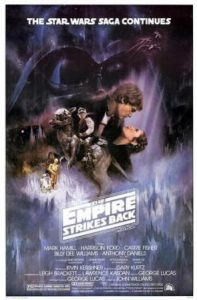I won’t bore you to death with tales of invisible lasers darting over my mum’s carpet or how I made rebel bases in our brick fireplace. I was a boy and being a boy in the 70s and 80s meant “Star Wars” and Electro music. If you had a relatively stress free upbringing those two things were the defining moments of your childhood.
So why do I feel more treacherous than my man Lando Calrissian?
Corinthians says, “When I was a child, I spake as a child, I understood as a child, I thought as a child: but when I became a man, I put away childish things.” That’s how I feel about the “Star Wars” movies now: I can take or leave them. Yep, you heard me right,, I couldn’t really care less. To me the whole expanded universe bollocks is akin to Japanese Knotweed slowly spreading across the globe – invasive, indestructible and unwanted.
Lucas has successfully reduced his promising saga to the level of James Bond films on a rainy Bank Holiday – great in parts, but mostly safe and lazy, easy to dip in and out of and with a tendency to blur into one. This process started a lot earlier than everyone thinks and we can’t blame the prequel trilogy. No, the rot (or should that be Knot?) set in when Lucas thought that Ewoks were a good idea to battle Stormtroopers in “Return of the Jedi.”
Still it’s not all doom and gloom. Down in the Mos Eisley Cantina, you could say my glass is half full rather than half empty. One of the “Star Wars” movies regularly makes my all time top 5.
“The Empire Strikes Back” takes its place on its own merits rather than a misplaced sense of childhood nostalgia. Nope, “Empire” deserves to be in such esteemed company as “There Will Be Blood,” “Bad Lieutenant: Port of Call New Orleans,” “Get Carter” and “Barry Lyndon” and here’s why.
Moments.
I think William Goldman said something about great movies being packed full of “moments” and “Empire” has enough to fill a Death Star. Not just the grandstand set pieces, but little nods and winks, tiny idiosyncrasies that sit with you long after the action figures have gone upstairs to the loft in an old quality street tin.
Whether its Han Solo making unnecessary but spectacular manoeuvres in the asteroid field, an Imperial Walker nonchalantly shooting a Snowspeeder out of the air or Vader’s off hand executions, “Apology accepted Captain Needa,” Lucas’ greatest triumph was to hand his old USC tutor Irvin Kershner the directorial reigns for “Empire.”
Kershner’s philosophy was simple, “I like to fill the frame with faces. There’s nothing more interesting than the landscape of the human face.” Lucas hated directing and especially directing actors. In contrast, Kershner revels in the screwball romance that develops between Leia and Han before breaking our hearts as she watches Han descend into the carbonite. “I love you” she says, “I know” he responds, Solo to the last.
“Empire” continually has us on the back foot, yanking the rug from under our feet with every other breath. Not only did it leave us dangling over Han’s fate, we had the added cliff hanger over Luke’s parentage. Christ, my mum only had to wait a season to find out who killed J.R., but in the days before blogs, leaked online scripts and “Ain’t It Cool News”, three years was an eternity. Still, we could always play the Hoth battle in the snow because we all wore Parker coats in the winter – so it wasn’t all bad.
“Empire” always more than a sequel; it was a second act, and written that way with purpose. Kershner mainlines a sense of pace directly to the audience, whic is rarely seen in cinema today. There is no let up, no escape and only glimpses of the “New Hope” that saw the Deathstar go supernova. Lucas’ script splits up his characters, then tortures, freezes, and brutalises them in a constant deluge of threat. Kershner makes us terrified for them – the Empire is all consuming, and he has us believe that joining the Dark Side of the Force is a truly hideous, blasphemous choice that will destroy Luke’s soul.
All this in a U certificate film.
Take Luke’s confrontation with Vader. Every stage drags him into a different hell, each one more horrendous than the last. Vader is toying with him, slowly revealing more of his dark powers one at a time. Luke doesn’t stand a chance, and when Vader finally breaks him down physically and mentally he reveals the greatest twist in all of cinema, “No, I am your father.” With mounting divorce rates in the 80s, it was comforting to know that even heroes can come from broken families.
We haven’t even touched on Yoda or Chewie’s forlorn cry when his friend Han is broken. We haven’t mentioned General Veers’ complete lack of respect for Vader even after seeing Admiral Ozzel chocked to death or Lando’s heroic u-turn. What about C3PO’s odds predictions, or the fact that the planet Hoth is named after the German Panzer General who couldn’t break through to the 6th Army at Stalingrad?
“The Empire Strikes Back” is the one truly exceptional “Star Wars” film, because it doesn’t trade on nostalgia or its name. It is bleak, dark, intelligent and endlessly exciting in a way that the later trilogy can only dream of. It is exceptional because it’s human – even down to the puppets, bounty hunters and aliens. It’s exceptional because it runs at light speed, and it’s exceptional because I love it, damn it!

